Verb Tenses: 12 English Tenses with Useful Tenses Charts
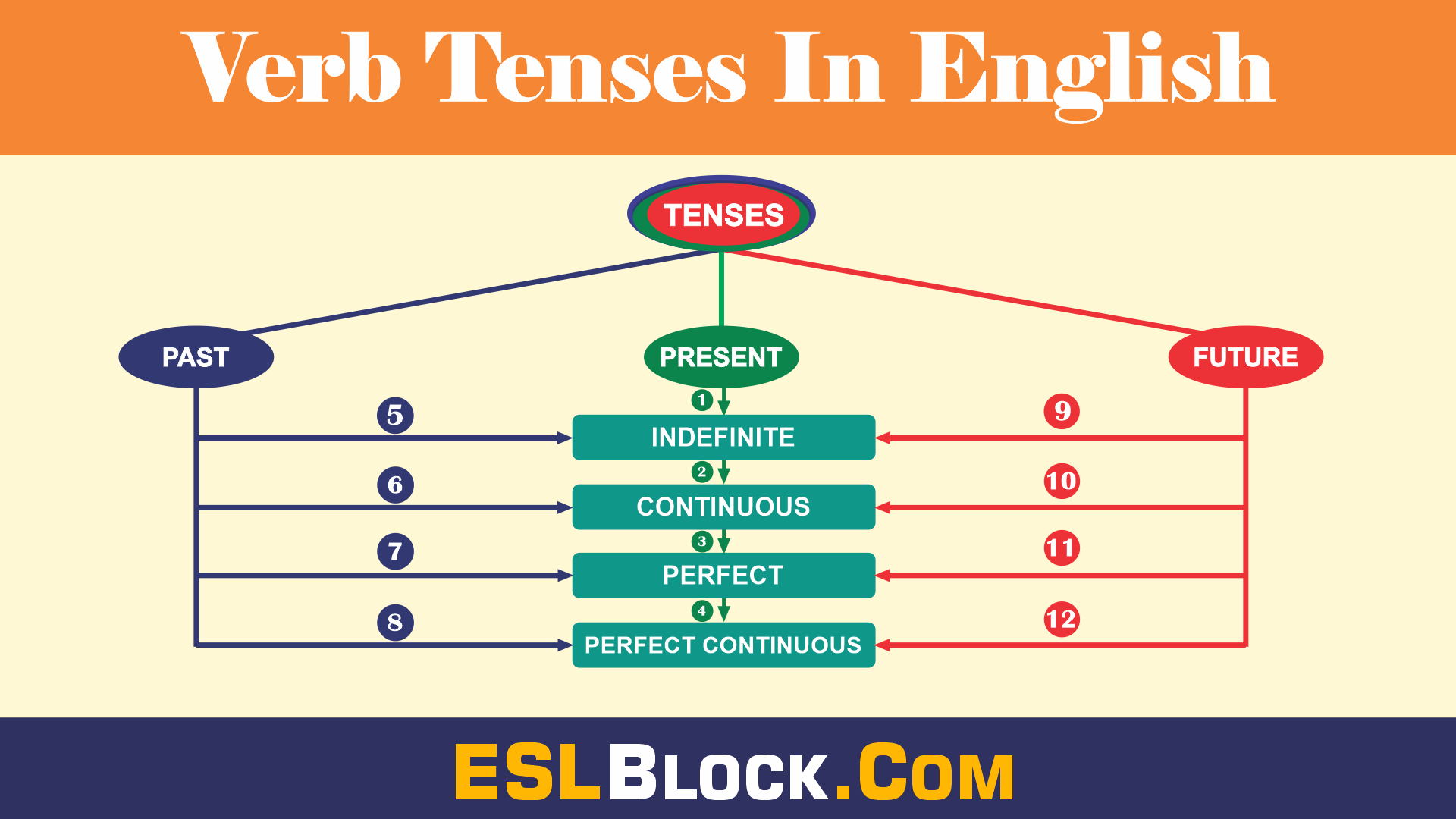
Do you wish to improve the quality of your English verb tense knowledge? In the present, past, and future, do you understand the tenses of your verbs? This article for teachers can aid in boosting your memory.
English Tenses can be useful when learning to speak the English language from the beginning.
Three major kinds of tenses are explained when the event mentioned in the statement took place.
Many English learners are worried about the tense. If you met 100 native English users in public and asked questions about the tense of their sentences, only one could give you an answer – if lucky enough. The remaining 99 will be clueless about phrases such as “past perfect” or “present continuous.” They can communicate fluently in English and communicate with ease. Of course, to communicate effectively in ESL, it’s helpful to learn about the tenses. But don’t get obsessed with the tenses. Learn to speak like native speakers! Naturally, speak!
Various verb forms to describe various actions at various moments in time are thought to be grammatical Tenses, also known as Verb Tenses. What is the definition of verb tenses, and how can you make use of these words? This article will look at verb tenses and will cover frequent mistakes, regional usages, and examples, as well as an examination of verb tenses and their variants.
What Are English Verb Tenses?
The verb’s tense tells that a person has done an act or was involved in something or took place. There are three primary verbs tenses in English: the present, the past, and future.
These categories (past, present, and future) are subdivided into four categories: simple continuous, perfect and flawless perpetual tenses.
The four categories (simple, continuous, perfect, and perfect continuous tenses) can be applied to various periods and states of operation. The details of the 12 tenses will be discussed in the next sections.
The 12 English Verb Tenses
A verb can only have two main forms, the past and present tense. The other tenses may be created by incorporating words like auxiliary verbs, is, am, are, has been, were, had, will, have, etc. This article will go over all the verb tenses and how to use them properly.
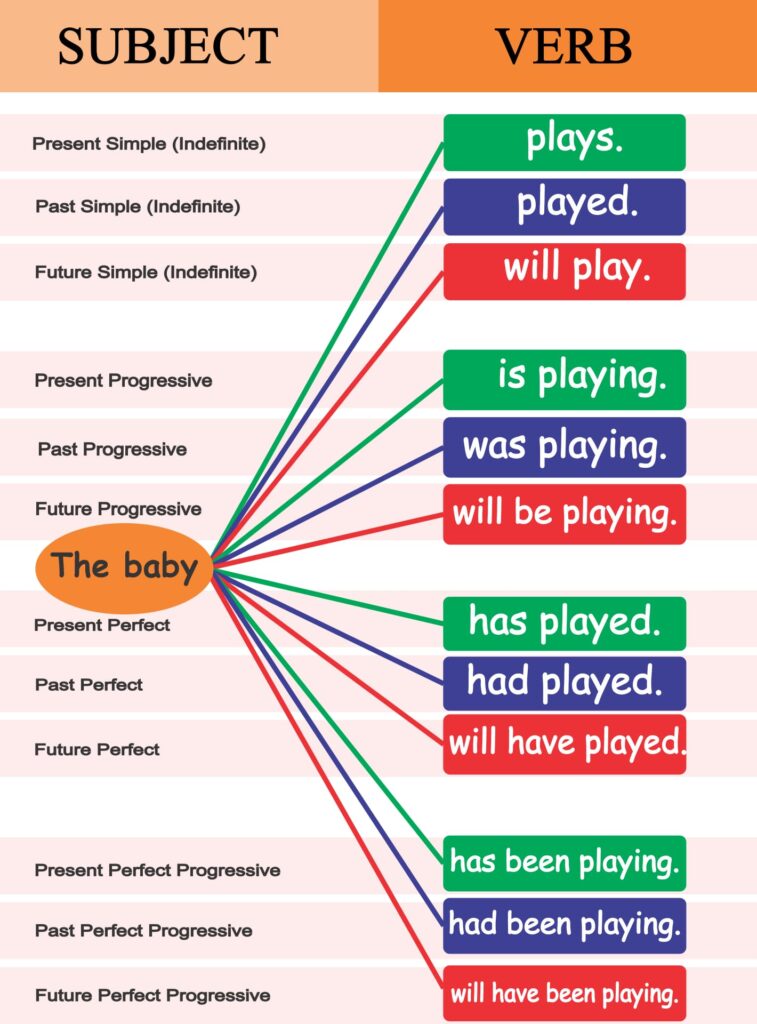
- Simple Present
- Simple Past
- Simple Future
- Present Continuous
- Past Continuous
- Future Continuous
- Present Perfect
- Past Perfect
- Future Perfect
- Present Perfect Continuous
- Past Perfect Continuous
- Future Perfect Continuous
Simple Tenses
“Simple tense” is a type of verb tenses. It includes all three tense types: the simple past tense, the simple present tense, and the simple future tense.
The three easy tenses convey facts or regular tasks. In contrast to the other tenses, the simple tenses define actions without stating specifically whether the actions have been completed or ongoing.
1. Simple Present Verb Tense
A simple present tense is a case when you use an adjective to describe events that occur continuously in the present time, such as every day or every week, or each month. We employ the simple present tense to describe anything that occurs frequently or is actual.

Simple Present Tense Example Sentences
Here are a few examples explaining simple present tense:
- They go to school daily.
- I play football outside after school.
- Every Sunday they eat spaghetti for dinner.
- Sophia runs towards school every day.
- They play the piano.
- He loves Mia now.
- We do apologize.
- I live in Sidney.
- The Moon goes round the Earth.
- William drives a taxi.
- She does not drive a car.
Simple present tense is used when we aim to express habits, general truth, future timetables, permanent situations, newspaper headlines, telling stories, for giving directions and instructions.
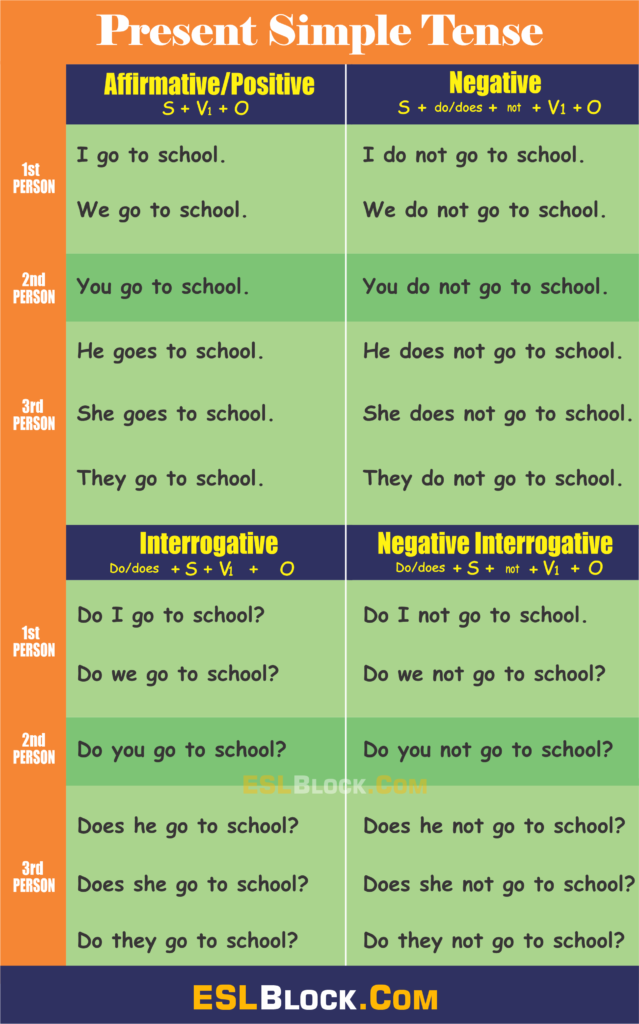
2. Simple Past Verb Tense
It is possible to use a variety of forms and tenses when talking about the past. However, it is the Past Simple tense, the one we mostly use.
In this lesson , we will explore how to use the arrangement and usage of Past Simple Tense. Then the quiz will be provided to assess your knowledge.
The past verb tense is used when discussing an action which has already taken place. It does not use the helping verbs. There are a set of rules to transform specific present verbs into past forms. Most verbs that are in the past tense (second form) include an additional “-d” or “-ed” following the base form. However, there are spelling changes.
Simple Past Tense Example Sentences
Here are a few examples explaining simple past tense:
- She ran towards bus yesterday.
- I played the cricket last winter.
- She loved him.
- We traveled to France.
- Sophia did not go to school.
- Did Mia love John?
- Did Amelia not like Tom?
- Did you see that dog?
- Did they watch TV last night?
- Did you not play football last week?
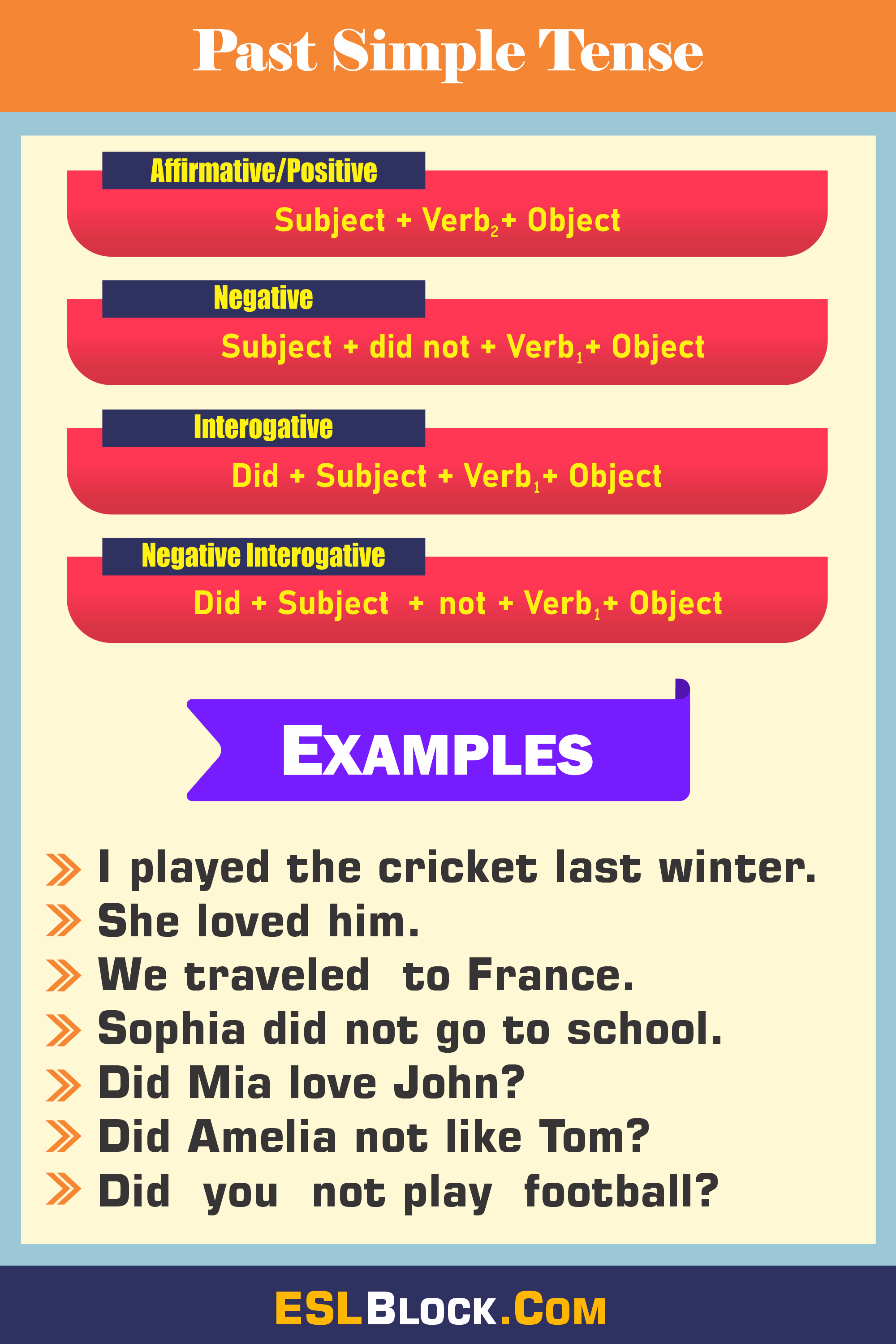
3. Simple Future Verb Tense
The simple future verb tense indicates an action that is to happen. It typically uses the words shall and will to indicate that it will continue to occur in the near future.
The future tense (e.g. I will or shall travel; he will speak, and we will speak) refers to events that haven’t occurred yet in the sense of time, but are expected, scheduled or expected to happen in the near future. Here are some of the most frequent scenarios where the future tense is used: To ask for information about the future (you will be in Washington tomorrow; OK, I’ll write that report on Monday).
Simple Future Tense Example Sentences
Here are a few examples explaining simple future tense:
- She will go.
- I don’t think I’ll buy that bike.
- They will celebrate our anniversary by flying to Washington.
- You will run towards gym tomorrow.
- I shall play the football.
- We will not come.
- She will not get the job.
- She will love him someday.
- Will he arrive soon?
- When will they leave?
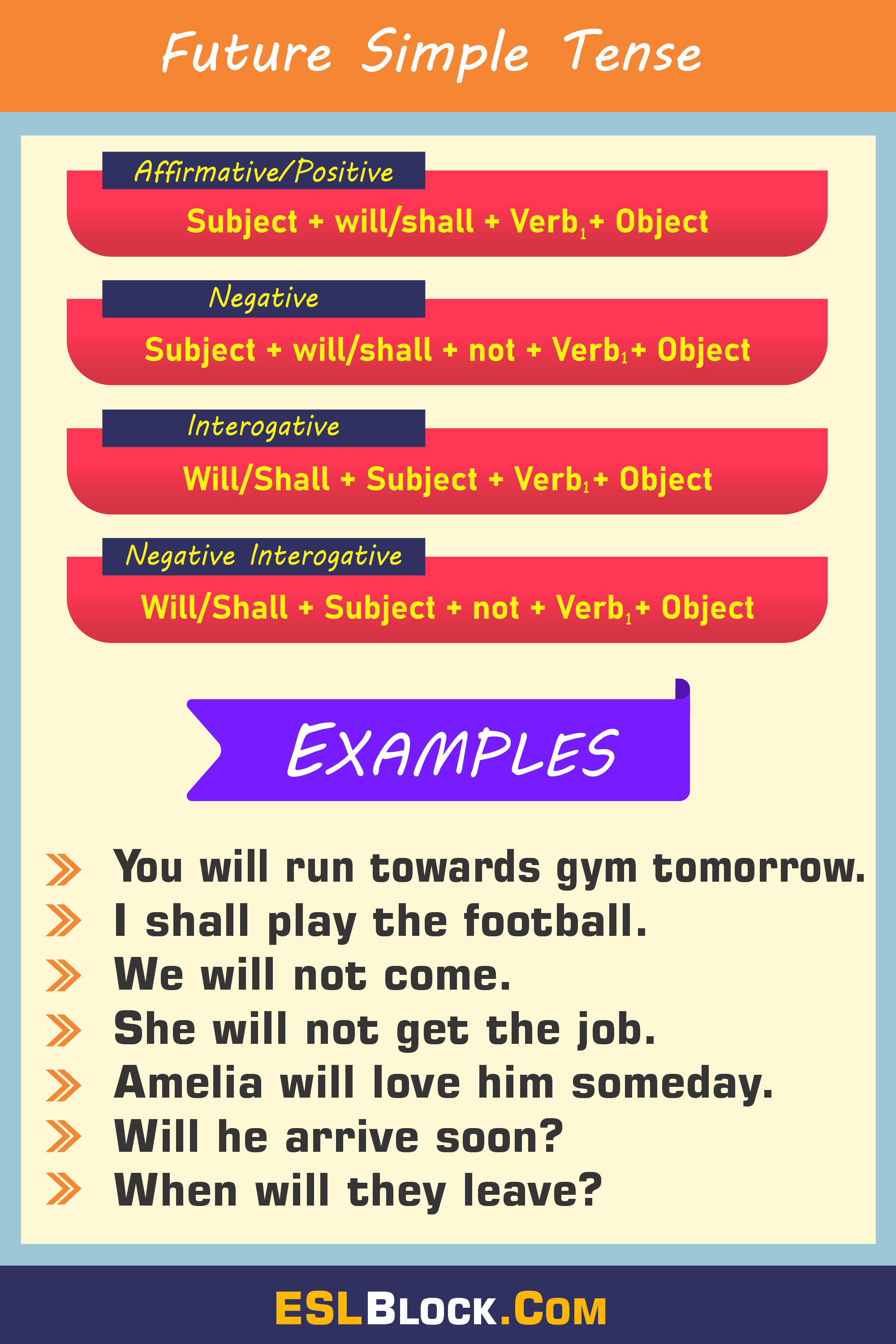
Progressive Tense
Progressive tense is a verb tense used to describe continuing actions. The progressive tenses are the future progressive tense, the past progressive tense, and the present progressive tense. The progressive tenses are sometimes called the “continuous” tenses.
4. Present Progressive
The present progressive relates to the events happening right now or progress. In this case, helping verbs are used, is, am and are. This present progressive tense refers to an ongoing event that is happening in the current time.
Although it’s a present tense, present progressive tense could refer to an event scheduled to occur in the near future (especially for planned activities).
Present Progressive Tense Example Sentences
Here are a few examples explaining Present Progressive Tense:
- William is eating a cake.
- Amelia is swimming in the river.
- They are painting the door.
- He is doing a funny walk.
- The car is going very slow.
- The bus is arriving in 5 minutes.
- I am watching a movie right now.
- She is still sleeping.
- We are moving to New York in the winter.
- His wife is always complaining about her health.
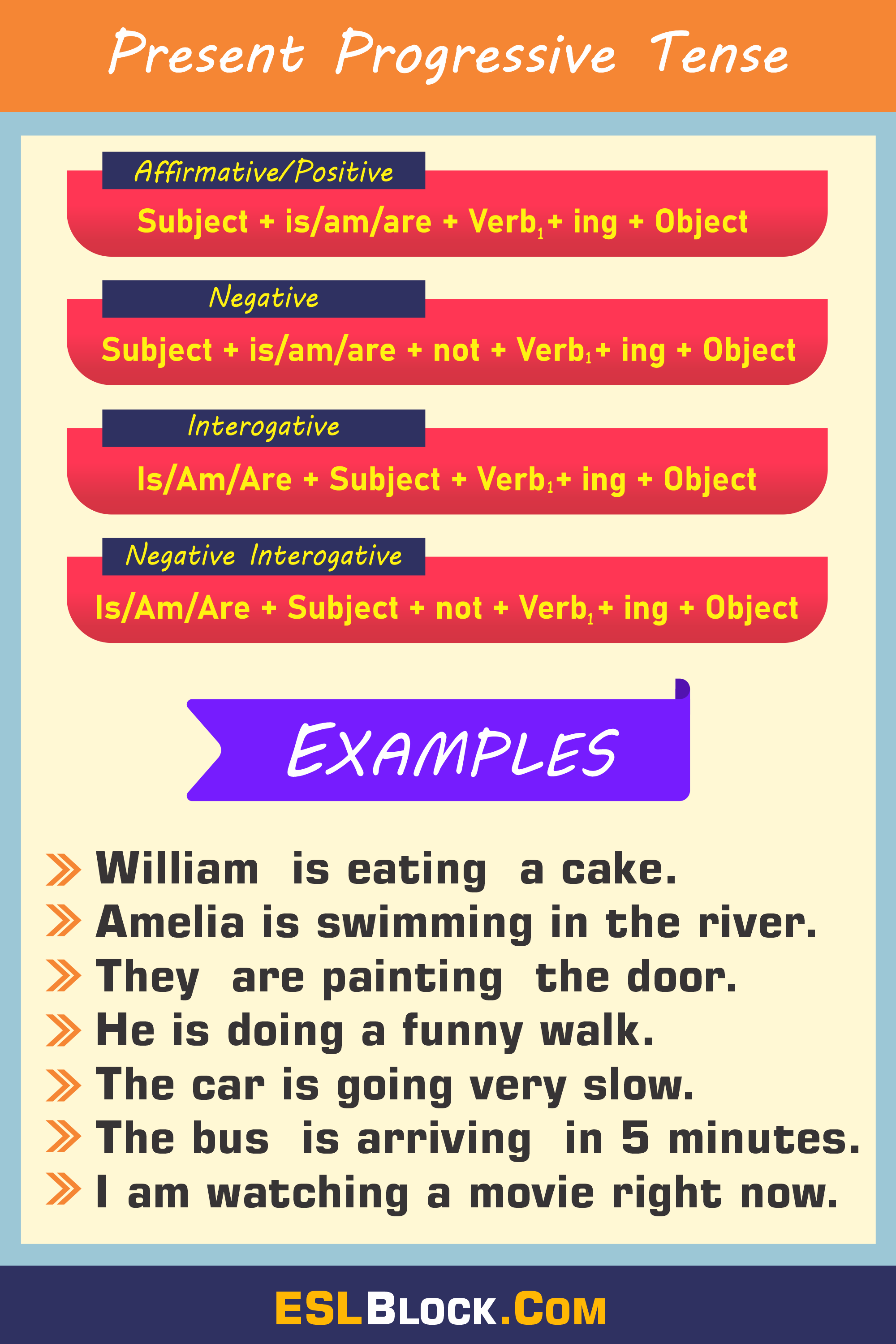
5. Past Progressive
The past progressive tense is used to describe a continuing event in the past. In past progressive tense, helping verbs are used, was and were.
Past progressive tense can be difficult for many people who aren’t native users to grasp because many languages do not have an equivalent.
The term “past progressive” describes an event taking place at a particular time during the previous days.
Past Progressive Tense Example Sentences
Here are a few examples explaining Past Progressive Tense:
- She was studying the report.
- They were talking while sleeping.
- William was baking a cake.
- You were painting the fence.
- He was writing an e-mail.
- We were painting the gate.
- I was watching a movie.
- John wasn’t lying when he said he loved you.
- John was baking a cake when the storm started.
- I was preparing dinner while Mia was working upstairs.
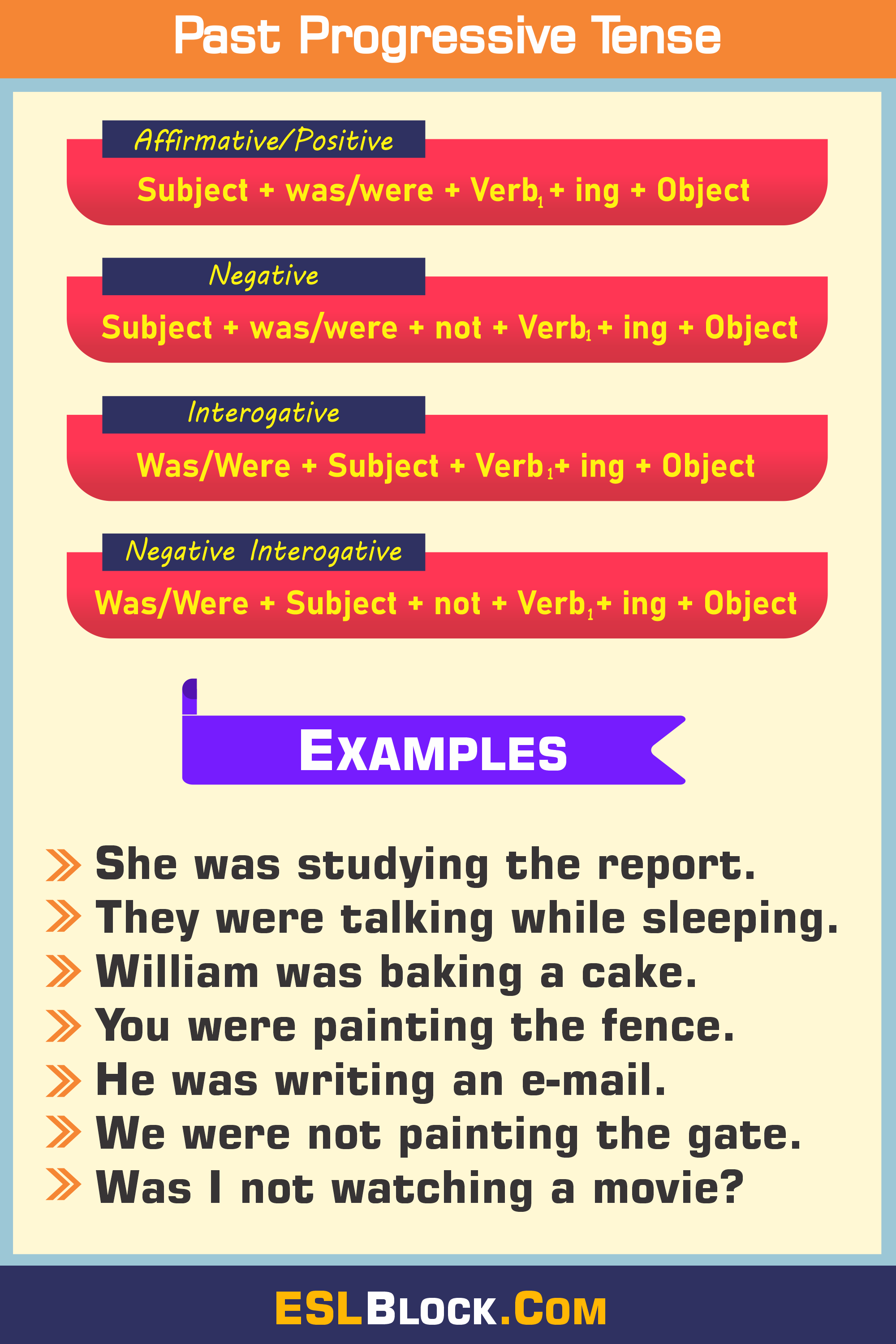
6. Future Progressive
The future progressive tense is used for a continuing action that will occur in the future.
Future continuous tense is called “the future progressive tense is an example of a verb tense which indicates that something is going to happen in the near future and will continue for a certain amount of time.
It is constructed with the help of the formula, will/shall be + verb + ing.
Future Progressive Tense Example Sentences
Here are a few examples explaining Future Progressive Tense:
- I will be watching William and Eric race.
- We will be finishing school soon.
- Will they be flying over sea soon?
- Amelia will not be coming home.
- Will you not be bargaining?
- By 3030, we will be driving spaceships.
- She will be sleeping late tonight.
- Aeroplan will not be landing on time.
- Will they be attending?
- She will be going to university next year.
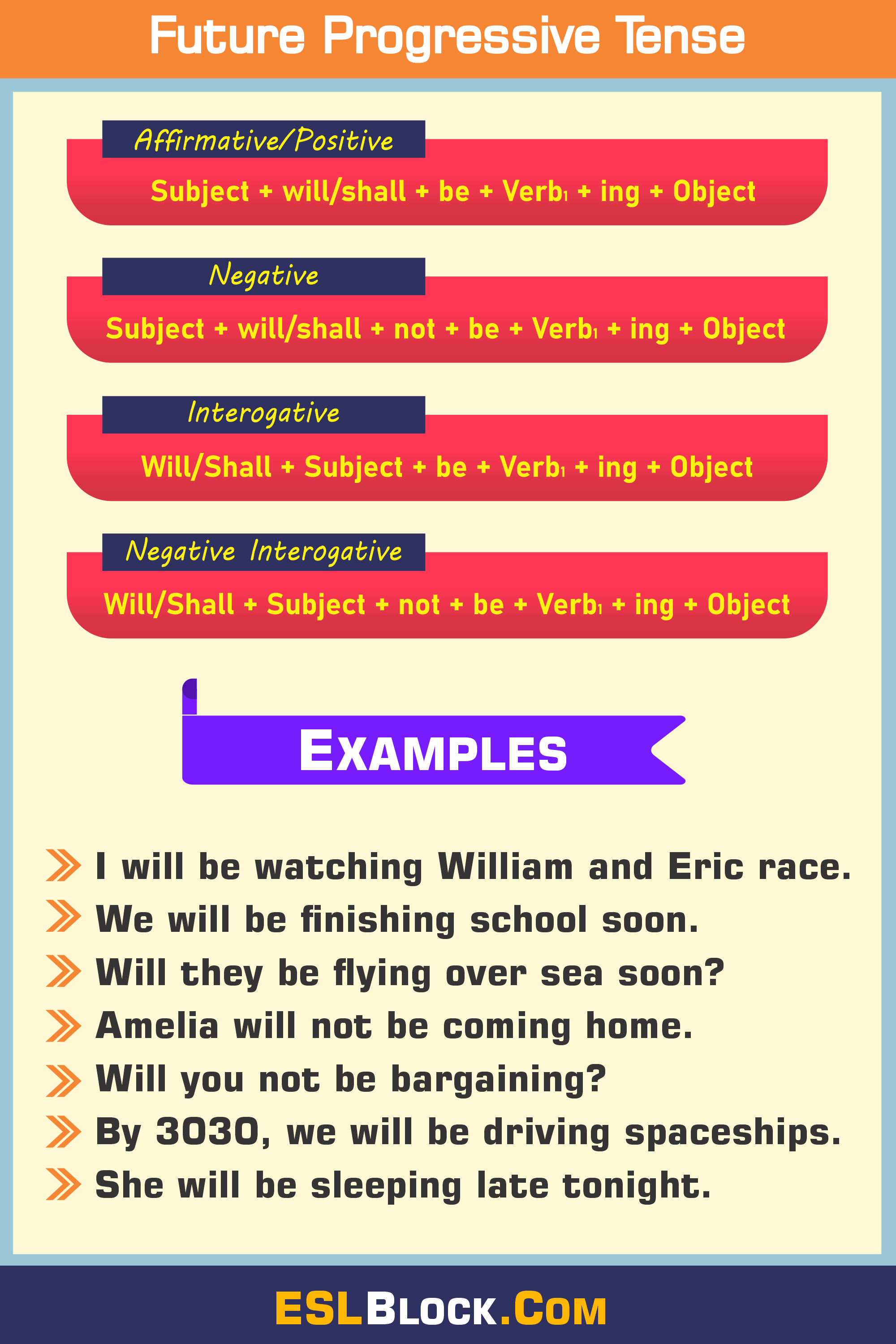
7. Present Perfect Tense
There are three things to consider to keep in mind when dealing the perfect present. Firstly the act is already completed just like all other perfect tenses. Secondly is that it could be referring to an event which was completed at an indefinite period of time in the past. And thirdly, it may be a reference to an event that began in the past, and continues with the present. Present perfect tense can be constructed making use of have/have and the past participle in the main verb.
Present Perfect Tense Example Sentences
Here are a few examples explaining Present Perfect Tense:
- She has finished his schoolwork.
- You have written five letters already.
- Have you seen the rabbit?
- I have eaten lunch.
- He has already come.
- We have bought the notebook.
- Who have you spoken with?
- Sofia has studied two foreign languages.
- They have bought a new bike.
- have people not traveled to Venus?
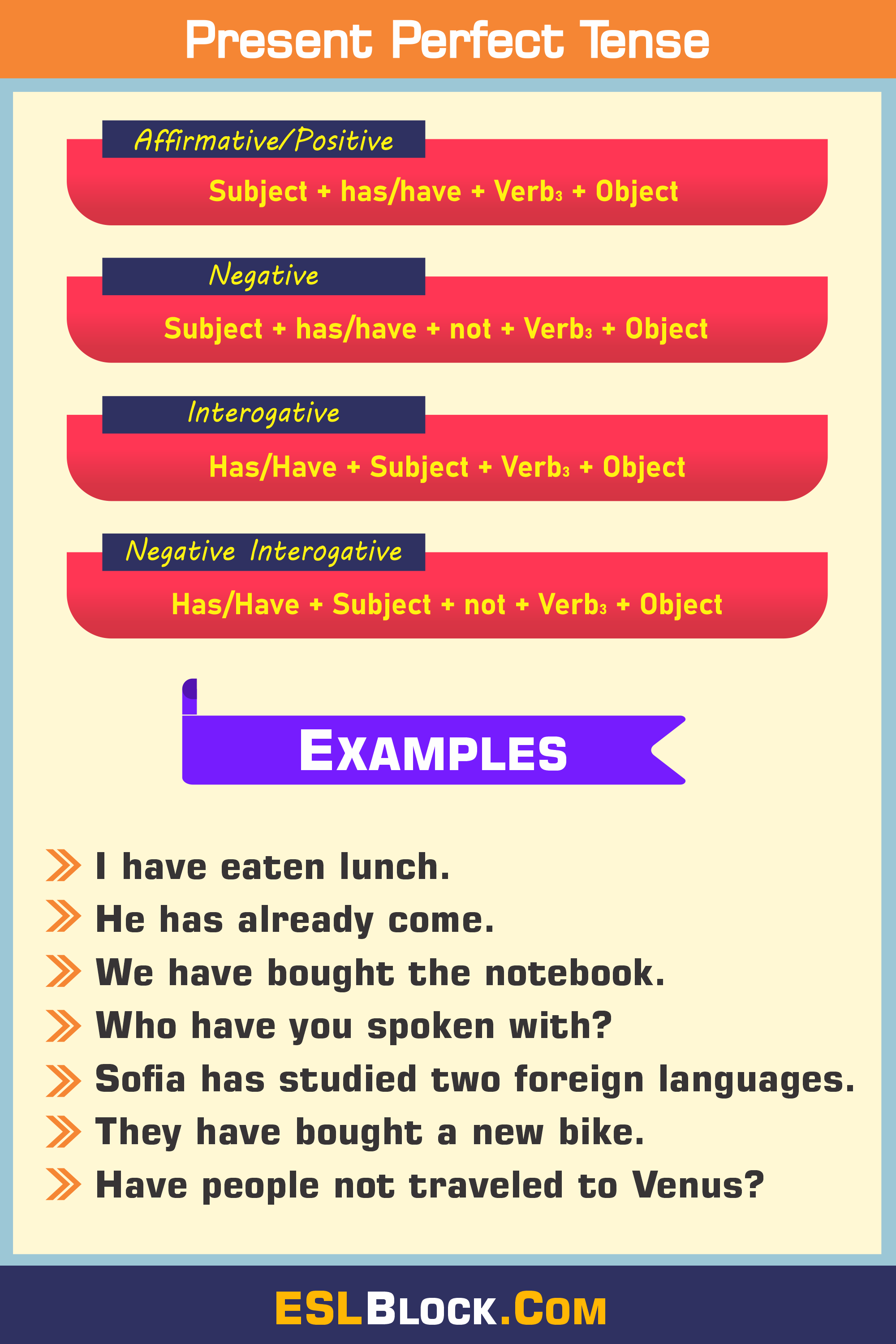
8. Past Perfect Tense
Past Perfect tense is quite an easy tense to use. The Past Perfect tense speaks on past events that occurred in the “past”.
Past perfect describes an event that has been completed before an incident in the past. To make the past perfect tense first use the word “had” and then join it to the past participle form.
Past Perfect Tense Example Sentences
- The boy had cried before her mother came.
- She told us that the train had left.
- Mia began to run after she had seen the rat.
- Had Amelia come late to the hospital?
- Had the water boiled when you went to kitchen?
- By the time I returned school, he had already left.
- Until he went to London, he had not spoken English.
- You went there after you had completed the task.
- When I came hotel, they had already eaten the dinner.
- She had never seen such a nice beach before she went to California.
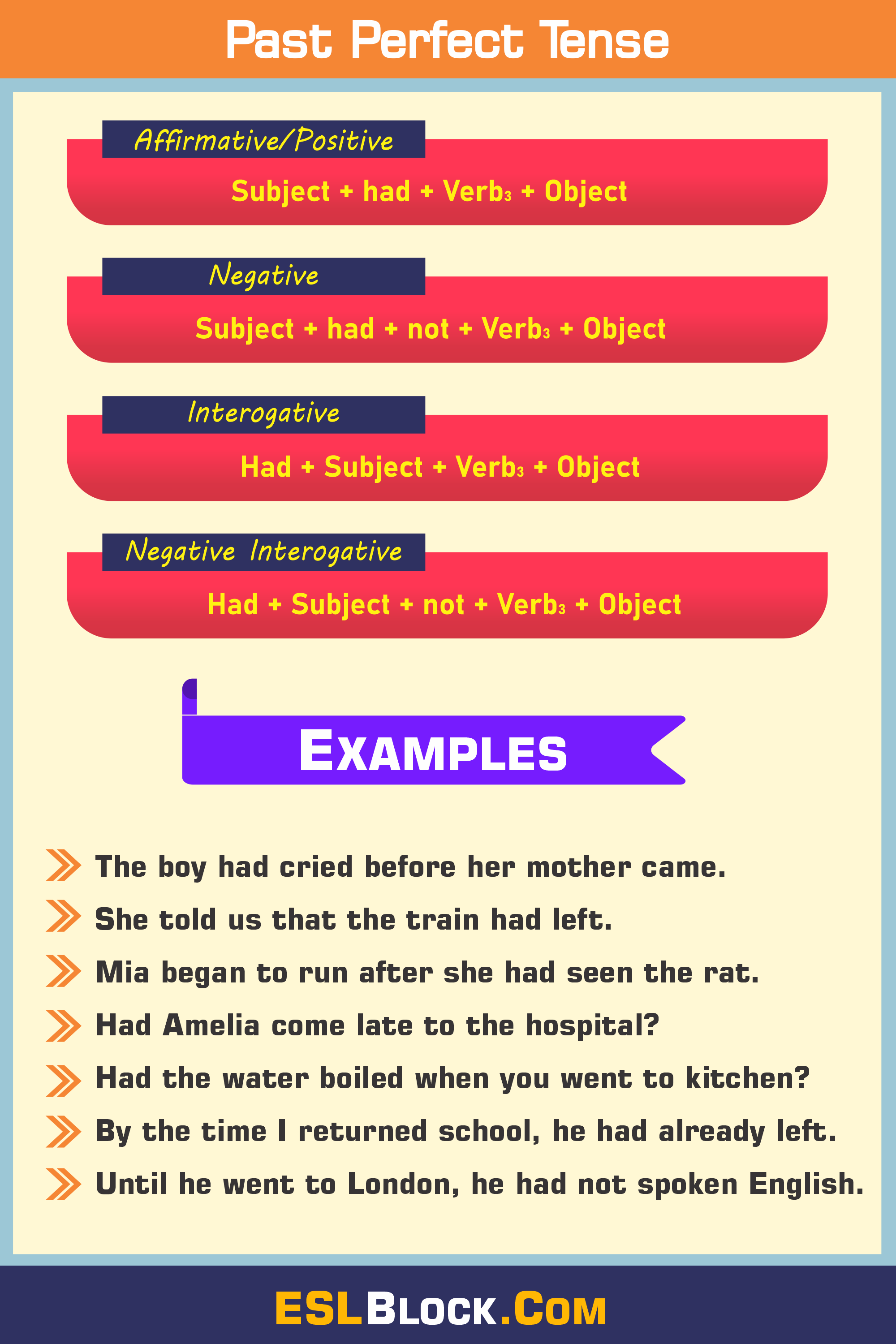
9. Future Perfect Tense
Future perfect tense can be used to signify an event that is coming up and has a specific date for its end. It follows a pattern that is will + have + 3rd form of verb.
For example, “Amelia will have gardened by then.” The essence in these tenses is you’re in the future, however there’s an end to it that has been in place prior to this imagined future. Let’s examine some examples of future perfect tense to clear things up.
Future Perfect Tense Example Sentences
- By next month, they will have earned lots of bitcoins.
- William will not have been married by next week.
- Margaret will have engaged Jerome by then.
- Dad will have brought our favorite bike.
- She will have forgotten everything.
- I will have finished when they arrive.
- Will you have bake a cake when I pick you up?
- Henry will not have ran by six o’clock.
- The plane will have launched by that time.
- Sophia will have slept seven hours.
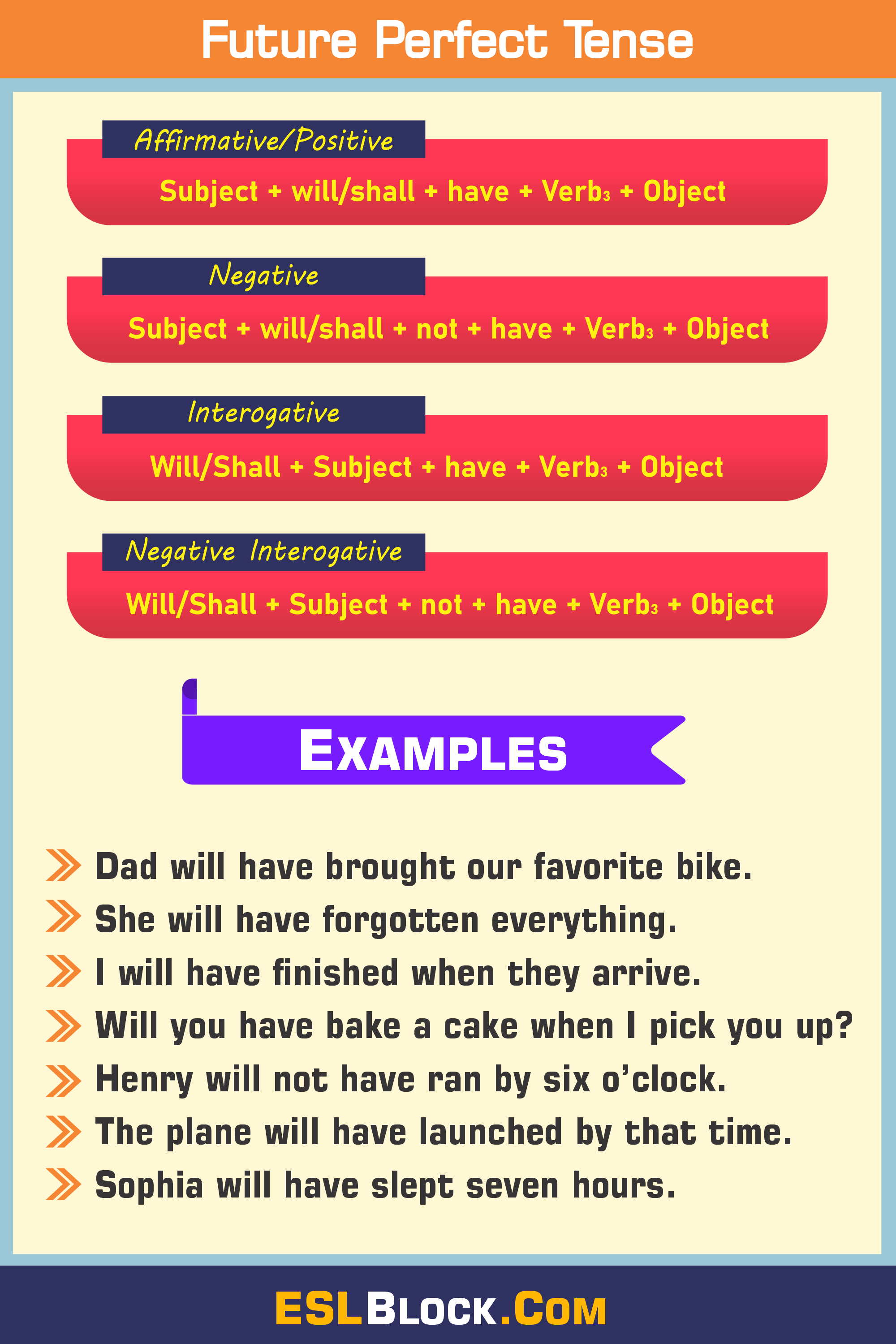
10. Present Perfect Progressive Tense
Present perfect progressive tense (also known as the present perfect continuous tense) shows that something started in the past and is continuing at the present time. The structure of the Present Perfect Continuous tense is:
has/have been + present participle (ing).
Present Perfect Progressive Tense Example Sentences
- They have been writing articles on different niches since night.
- She has been reading the newspaper for three hours.
- We have been playing cricket for five hours.
- He has been finding the shoes since afternoon.
- She has been studying in the classroom for two hours.
- I have been reading Harry Potter for a month now.
- Have we been listening to songs since morning?
- She has not been watching the football match for three hours.
- Have you been preparing the handouts for five hours?
- You have been helping him to do the task for six hours.
- My sister has been cooking for four hours.
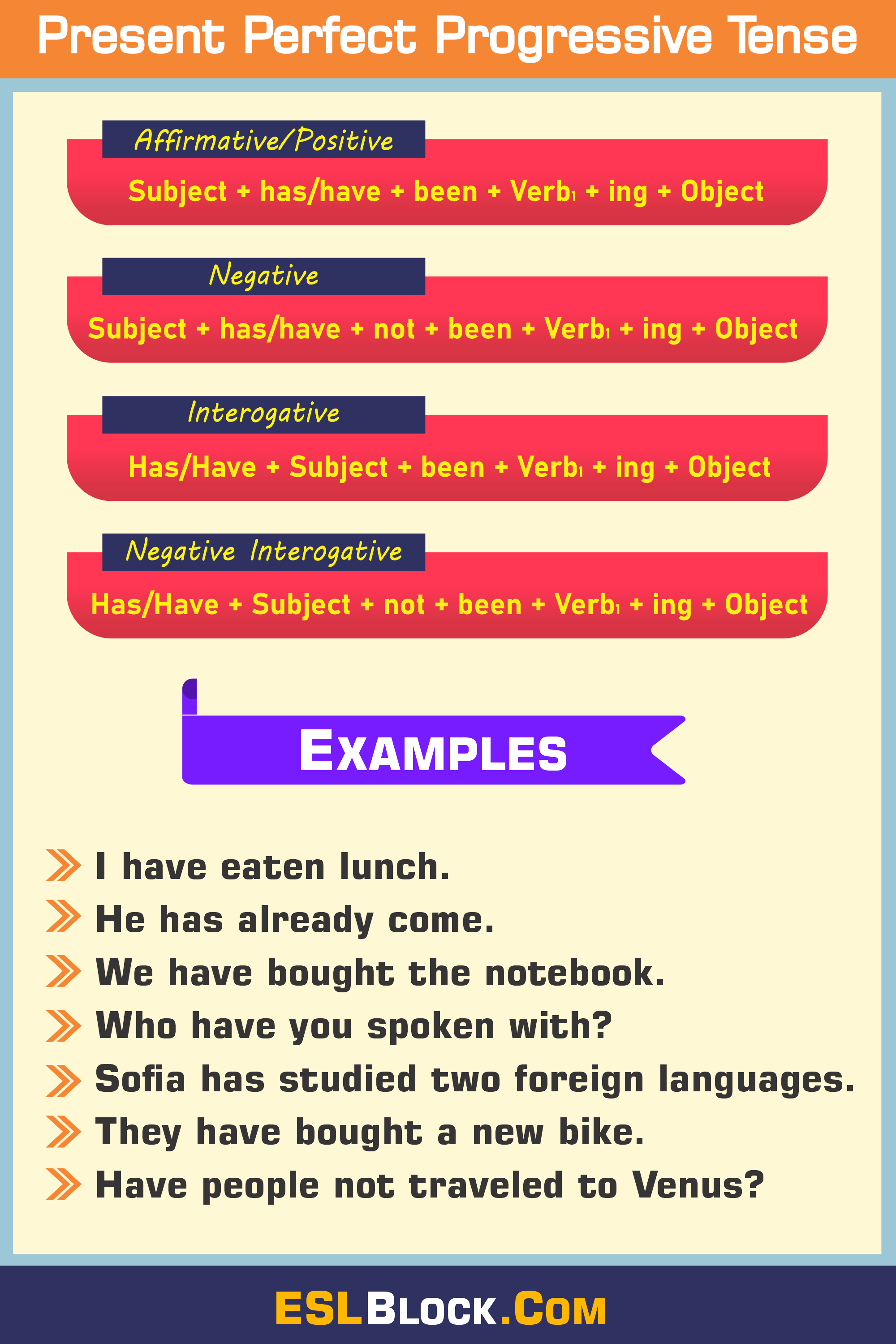
11. Past Perfect Progressive Tense
A past perfect continuous tense (also known as the past perfect progressive tense) indicates that an event that began in the past was carried on to the point in the past in another time. This tense can be created by using had been and the verb’s present participle (root + ending). It is also known as the Past Perfect Continuous, which expresses the “past in the past.”
Past Perfect Progressive Tense Example Sentences
- She had been drinking milk when Mom walked into the kitchen.
- He had been playing cricket for three hours.
- The child had been studying since last night.
- Amelia had been drafting the plan for a meeting for five hours.
- I had been eating my favorite fruit.
- They had been walking in this road since morning.
- Had Mia been dancing for three hours?
- Had we been traveling for three days?
- She had not been bathing in the rain since evening.
- The mechanic had been repairing my car since morning.
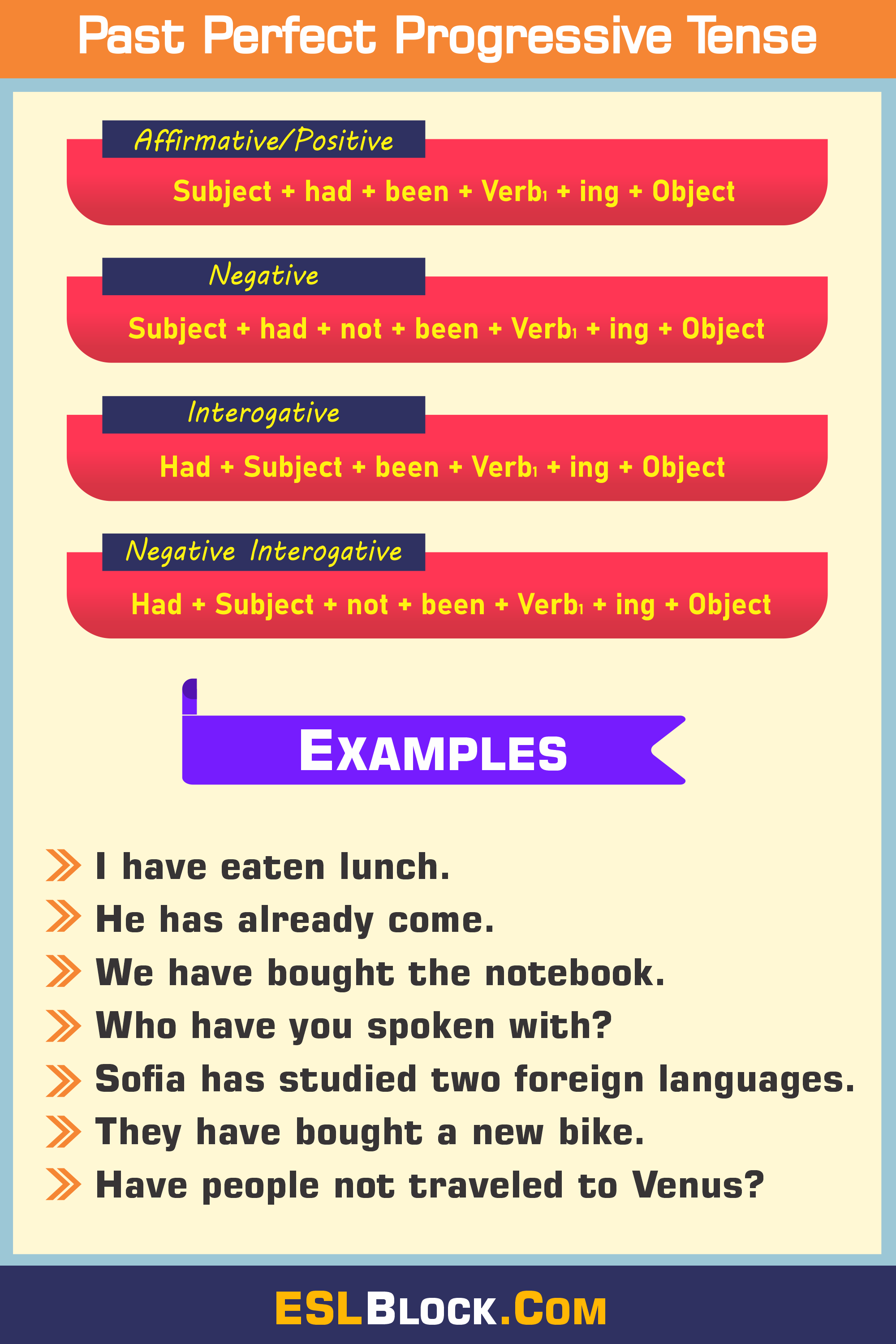
12. Future Perfect Progressive Tense
The future perfect continuous tense, also known as the future perfect progressive tense, is used to indicate a continuous action in the future. Formula for future perfect tense is will + have + been + first form of verb with ing.
Future Perfect Progressive Tense Example Sentences
- In December, Isabella will have been working at her company for five years.
- At six o’clock, I will have been waiting for forty minutes.
- Lucas will have been baking a cake.
- They will have been studying at university for two years.
- She will have been living in England for ten years.
- I will have been dancing before they join us.
- Will you have been going to the concert before I come?
- We will have been playing cricket before you reach.
- Liam will have been reading various kinds of books.
- Ava will not have been attending the program before she finishes this job.
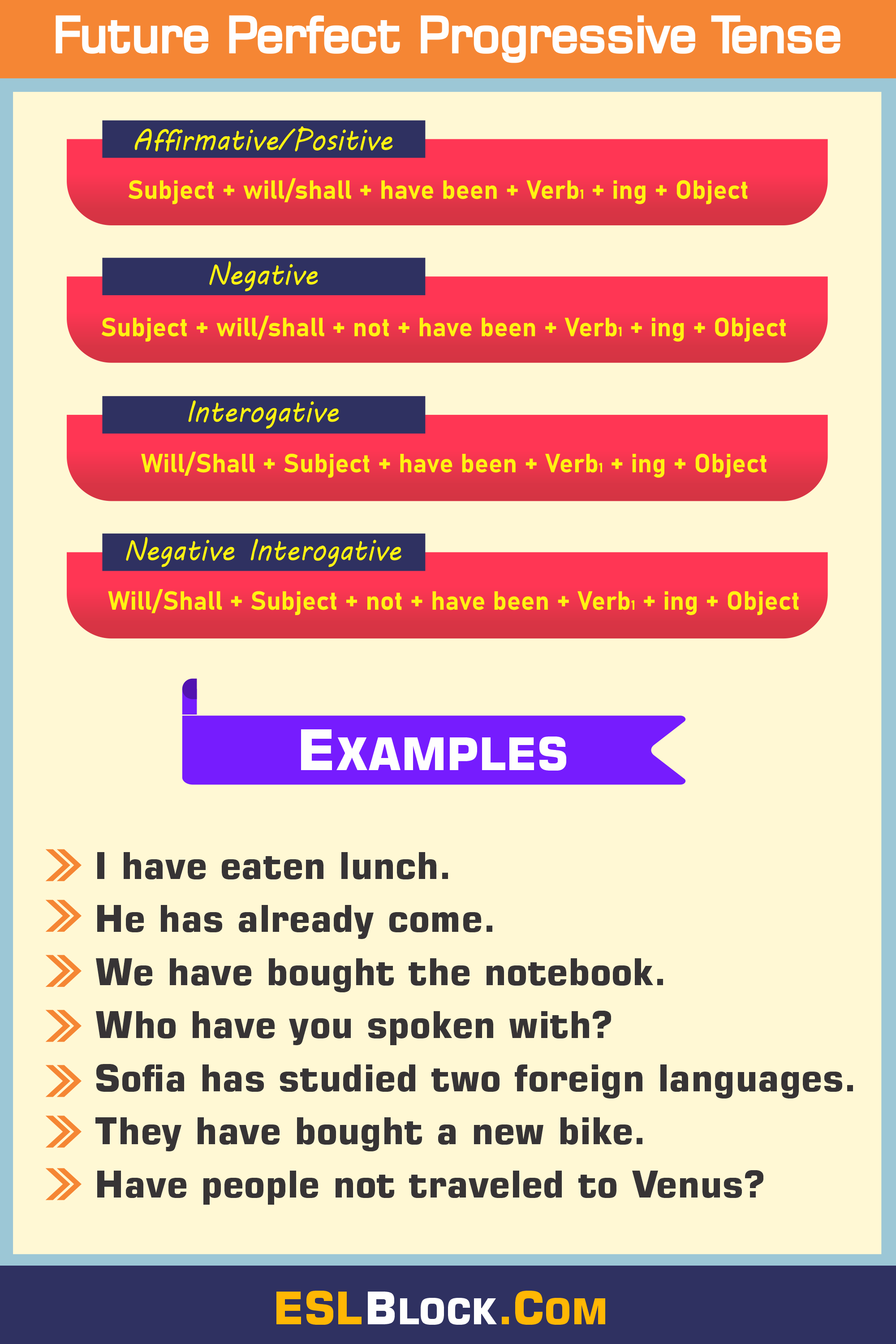
If you’re having any doubts about the qualities of a English Tenses and example sentences, you can leave a comment below, and we’ll attempt to give you feedback.
If you really enjoyed article “English Tenses“, then I will be very thankful if you’d help it spread by emailing it to your friends, or sharing it on Twitter, Instagram, Pinterest or Facebook. Thank you!
Explore full list of words that start with A to Z!

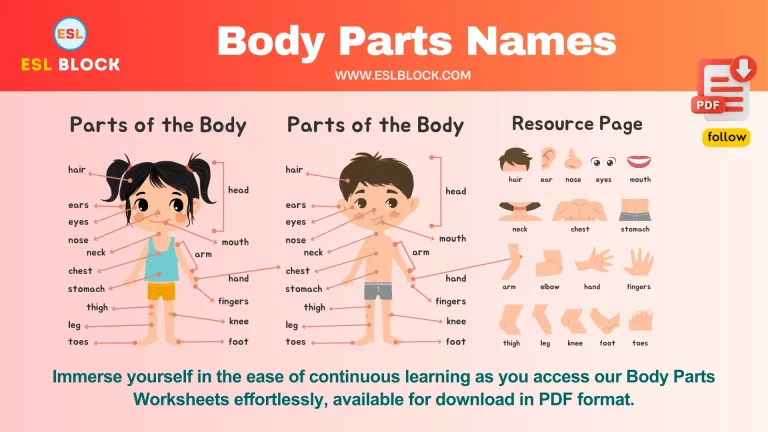
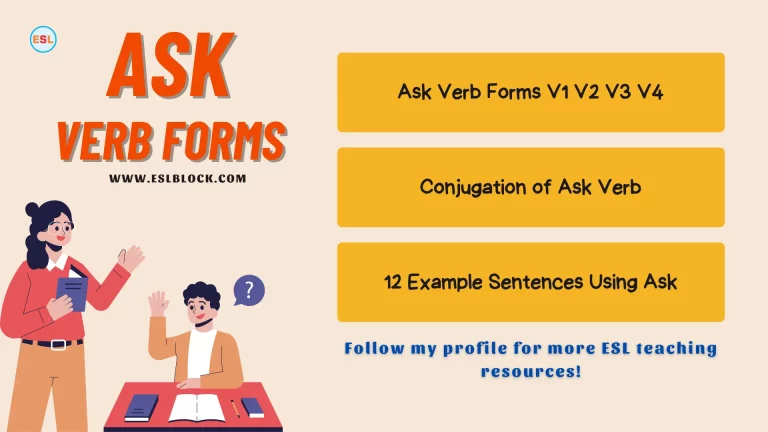
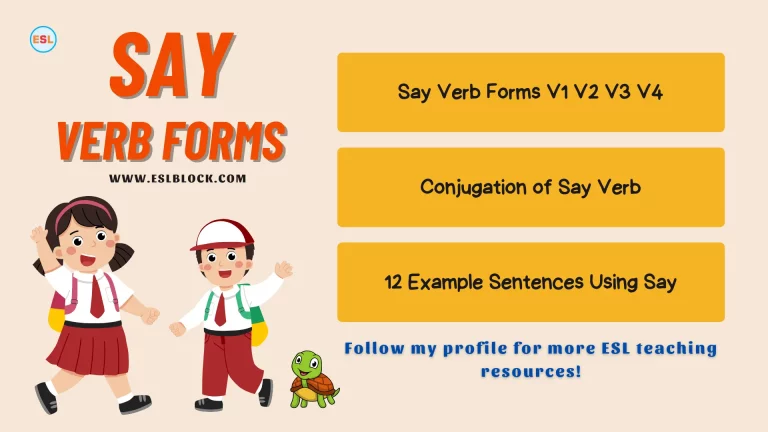
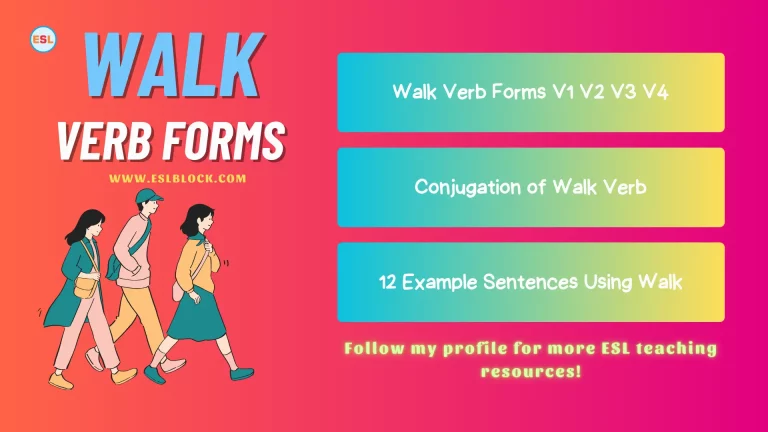
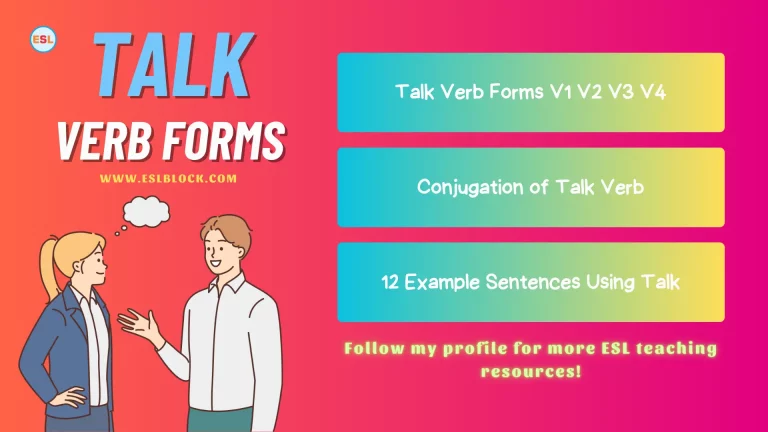
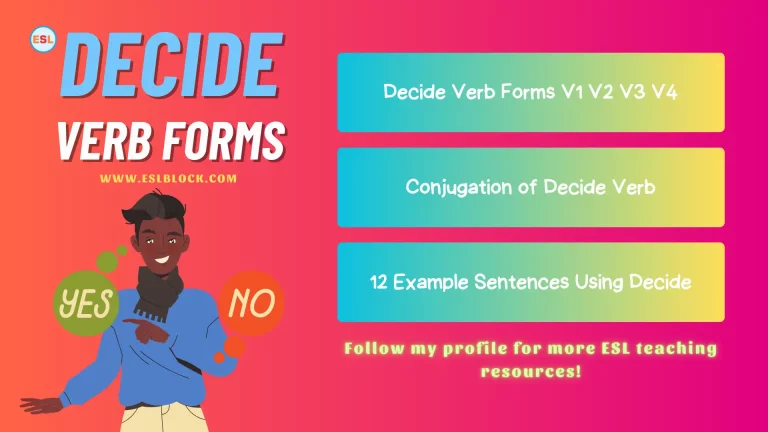
You actually make it seem so easy with your presentation however
I find this topic to be really one thing that I believe I’d never understand.
It sort of feels too complex and very large for me.
I am looking ahead to your subsequent publish,
I will attempt to get the grasp of it!
Wonderful blog you have here but I was curious if you knew of any discussion boards that cover the same topics discussed
here? I’d really love to be a part of group where I can get suggestions from other
knowledgeable individuals that share the same interest.
If you have any recommendations, please let me know. Cheers!
That is a really good tip especially to those new to the
blogosphere. Brief but very precise info… Many thanks for sharing
this one. A must read article!
You’re so awesome! I don’t believe I’ve truly read through something like this before.
So good to find someone with unique thoughts on this
topic. Seriously.. thank you for starting this up. This site is something
that’s needed on the internet, someone with a little originality!
Fantastic beat ! I wish to apprentice whilst you amend your site, how could
i subscribe for a blog website? The account helped me a acceptable deal.
I have been a little bit familiar of this your broadcast provided vibrant clear
concept
Hi are using WordPress for your blog platform?
I’m new to the blog world but I’m trying to get started and
create my own. Do you need any coding knowledge to make your own blog?
Any help would be greatly appreciated!
Hello friends, nice piece of writing and fastidious arguments
commented here, I am in fact enjoying by these.
If you want to obtain a great deal from this paragraph then you have to apply such techniques to your won web site.
Hey I know this is off topic but I was wondering if
you knew of any widgets I could add to my blog that automatically tweet my newest twitter updates.
I’ve been looking for a plug-in like this for quite some time and was hoping maybe you would have some experience with something like this.
Please let me know if you run into anything. I truly enjoy reading
your blog and I look forward to your new updates.
When someone writes an post he/she maintains the idea of
a user in his/her mind that how a user can understand it.
Therefore that’s why this paragraph is amazing.
Thanks!
google
The next time I read a blog, I hope that it doesnt disappoint me as much as this one. I mean, I know it was my choice to read, but I actually thought youd have something interesting to say. All I hear is a bunch of whining about something that you could fix if you werent too busy looking for attention.
Very interesting information!Perfect just what I was searching for! “If you bungle raising your children, I don’t think whatever else you do matters.” by Jacqueline Lee Bouvier Kennedy Onassis.
Hello there, You have done a great job. I’ll definitely
digg it and personally recommend to my friends. I am sure they’ll be benefited from this website.
My web site – moneyveo work
Hey very cool website!! Guy .. Beautiful .. Superb .. I will bookmark your website and take the feeds also…I’m happy to find numerous helpful information right here within the submit, we want work out extra techniques in this regard, thank you for sharing. . . . . .
F*ckin’ awesome things here. I am very glad to peer your article. Thanks a lot and i’m taking a look ahead to contact you. Will you kindly drop me a e-mail?
I just like the helpful info you supply to your articles.
I’ll bookmark your blog and take a look at again here regularly.
I am relatively sure I’ll be informed lots
of new stuff proper right here! Good luck for the next!
This article is such a clear and helpful guide to verb tenses! I really appreciate the emphasis on not getting too bogged down in the technical names, especially since you mentioned even native speakers don’t always know them. That’s a huge relief and makes the whole learning process feel less intimidating. It’s so practical. Do you have any quick tips for how to practice using the more complex tenses, like the perfect continuous ones, in daily conversation without overthinking them? ESLBlock always delivers great content!